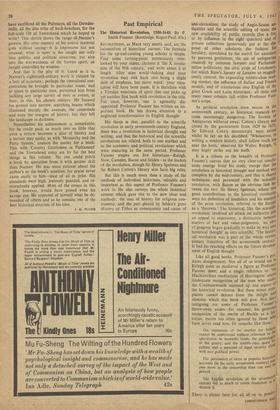Past Empirical
The Historical Revolution, 1580-1640. By F. Smith Fussner. (Routledge, Kegan Paul, 45s.)
REVOLUTIONS, as Marx very nearly said, are the locomotives of historians' careers. The formula for the up-and-coming young scholar is simple. Find some turning-point mysteriously over- looked by your elders, christen it 'the X revolu- tion of the Nth century,' and write about it at length. After nine world-shaking days your revolution may sink back into being a slight shift of emphasis, but never mind: your repu- tation will have been made. It is therefore with a Tiresian weariness of spirit that one picks up yet another first book with revolution in the title. For once, however, one is agreeably dis- appointed. Professor Fussner has written an im- portant book. He has drawn attention to a neglected transformation in English thought.
His thesis is that, parallel to the scientific revolution in early seventeenth-century England, there was a revolution in historical thought and writing; and that the historical and the scientific revolutions are related, both to one another and to the economic and political revolutions which were maturing in the same period. Professor Fussner singles out five historians—Ralegh, Stow, Camden, Bacon and Selden—as the leaders of the revolution, though Sir Henry Spelman and Sir Robert Cotton's library also have big roles.
But this is much more than a study of the methods of individual historians, valuable and important as this aspect of Professor Fussner's work is. He also surveys the whole historical context which gave rise to the new ideas and methods: the uses of history for religious con- troversy, and the part played by Selden's great History of Tithes as consequence and cause of anti-clericalism; the study of Anglo-Saxon ark tiquities and the scientific editing of texts; the new availability of public records (for a fee, or by influence in the right quarters) and of private collections (generously put at the dis- posal of other scholars); the fashion for i heraldry, stimulated by the search for ancestors by parvenu gentlemen; the use of antiquarian research by common lawyers and Parliamen" tarian politicians; the civic pride of Londoners, for which Stow's Survey of London so magnifi' cently catered; the expanding middle-class read' ing market; the influence of Italian and French models, and of translations into English of the great Greek and Latin historians: all these and many more subjects fall within Professor Fuss- ner's scope.
As political revolution drew nearer in the seventeenth century, so historical research be' came increasingly dangerous. The Society of Antiquaries withered away; Cotton's library was closed by the government from 1629 to 1631 Sir Edward Coke's manuscripts were seized whilst he lay on his deathbed. 'Whosoever, in writing a modern history, shall follow truth ton near the heels,' observed Sir Walter Ralegh, may haply strike out his teeth: It is a tribute to the breadth of Professor Fussner's canvas that no very clear-cut conclik sions emerge from his study, except that the revolution in historical thought and method Was, complete by the mid-century, and that it sharer' techniques and personnel with the scientific revolution, with Bacon as the obvious link be' tween the two. Sir Henry Spelman, whose two great contributions to the historical revolution were his definition of feudalism and his analysis of the price revolution, referred to the former as a 'theorem.' The historical, like the scientific ial revolution, involved an attack on authority a, an appeal to experience; a distinction between matters of fact and value-judgments; 'an idea of progress began gradually to make its way into historical thought' as into scientific. 'The history cal revolution was a part of the whole revolt'', tionary transition of the seventeenth century' It had far-reaching effects on the future develop' ment of English thought.
Like all good books, Professor Fussner's Pr?' duces disagreement. Not all of us would see 111 Ralegh quite so mediaeval a figure as Professor Fussner does; and a single reference to 'the Machiavellian meditations of Harrington' seals inadequate recognition of the man who under, the Commonwealth summed up one aspect a" the historical revolution. But these minor corgi; plaints cannot detract from the delight and stimulus which this book will give. Not least', intriguing are some of Professor Fussner: throw-away asides—for instance, his generous recognition of the merits of Buckle as a 'its; torian, merits too often ignored by those Wfi have never read him. Or remarks like these: the expansion of the market for hist0,0 11 cannot be understood without reference to t1", speculation in monastic lands, the genealogfr of the gentry, and the middle-class quest 1,.ug culture and a measure of legal security al°P with new political power.
1
The persistence of error in popular historic5, accounts [in the early seventeenth century] 0134. owe more to the censorship than can ever I'
proved.
The English revolution of the seventeenth century did as much to create feudalism as .0
destroy it.
There is plenty here for all of us to Ponder. CHRISTOPHER trig










































 Previous page
Previous page